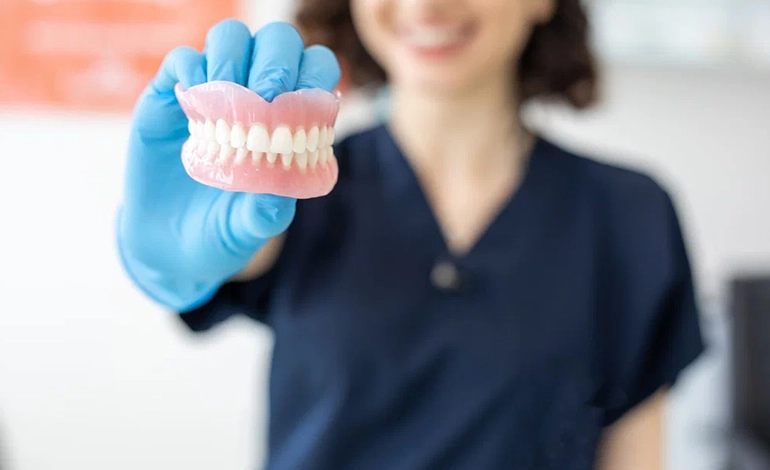Key Differences between Partial and Complete Dentures
Number of Teeth Replaced
Partial Dentures: When original teeth carry on, partial dentures close the openings. These custom-made prosthetics restore smiles and function, blending seamlessly with existing teeth. Dentists recommend partials to keep oral health and prevent more tooth loss. They fill gaps from missing teeth. They let the other teeth support them.
Complete Dentures: When an entire arch lacks teeth, full dentures step in. Your smile was reimagined. Our bespoke prosthetics blend artistry and precision, creating a natural look that's uniquely yours. Experience the confidence of a flawless grin, tailored to perfection, from upper to lower; they restore your confidence, one tooth at a time. They bring back smiles, speech, and function to edentulous patients.
Fit and Support
Partial Dentures: Clasps or brackets secure the fit of partial dentures. They attach to the remaining natural teeth. This ensures the denture stays put, anchoring your smile beautifully. It aligns your remaining teeth, creating harmony in your mouth's landscape.
Complete Dentures: They use suction, gum shape, or adhesives to stay in place. With no natural teeth for support, complete dentures must fit precisely over the gums to keep them secure.
Material and Design
Partial Dentures: These dentures often have a metal frame with acrylic or flexible parts. Durable metal forms the foundation, topped by acrylic that convincingly imitates gum tissue's appearance.
Complete Dentures:Lightweight acrylic anchors most full dentures, delivering a natural look. Teeth of acrylic or porcelain mesh with gums molded to resemble real tissue. This fusion yields a lifelike smile, restoring both form and function. Wearers regain confidence as their prosthetic seamlessly blends aesthetics and practicality, revitalizing their oral landscape.
Functionality
Partial Dentures: They fill gaps between natural teeth. They restore chewing and speaking. They also prevent remaining teeth from shifting. This could affect bite and alignment.
Complete Dentures: Full dentures restore chewing and speech even though they can take time to adjust to. Without natural teeth, the jaw may lose bone mass over time. As the gums and bone change, full dentures may not fit.
Adjustment Period
Partial Dentures: They fit around natural teeth. So, the adjustment period is usually shorter. However, there may be some initial discomfort as the new denture fits around the gums and remaining teeth.
Complete Dentures: The adjustment period for complete dentures can take longer. There are no natural teeth for support. Individuals may experience soreness, irritation, and difficulty speaking or eating at first. Over time, adjustments may be needed as the gums change shape.
Maintenance and Care
Partial Dentures: Keep your partial dentures plaque-free with daily care. Regular cleaning maintains their condition and hygiene. Proper maintenance ensures lasting use and oral health. It is important to keep both dentures and natural teeth clean. This ensures hygiene and prevents damage to the dentures.
Complete Dentures: Entire dentures require everyday maintenance and cleaning. With no natural teeth, the focus is solely on the denture. Remove them at night. Clean them with a denture brush. They need to be immersed in water or denture solution to keep their form pristine.
Cost
Partial Dentures: Partial dentures offer a budget-friendly alternative to full sets. By replacing only select teeth, they keep costs down. Design intricacy and material choices influence the final price tag. Despite variations, these dental solutions typically remain more affordable than their complete counterparts.
Complete Dentures: Entire dentures tend to be a little costly than partials. They require custom fabrication to replace an entire set of teeth. However, the cost can vary. It depends on the materials used and if they are conventional or implant-supported.
Which One Is Right for You?
Choose between partial and complete dentures. It depends on how many teeth you've lost and your dental health. If you have healthy, strong teeth, partial dentures can be a great option. They can fill gaps and prevent tooth movement. If you are missing all your teeth, complete dentures may be best. They can restore function and appearance.
Both types of dentures need careful thought and a dentist's advice to find the best fit for you. Your dentist will guide you to pick the best solution for your goals. Also, advances in implant dentistry allow for implant-supported dentures. They are more stable and comfortable.
Schedule Your Dental Check-Up Today With our Dentists today!
Crown Dental Clinic Clinic's expert team awaits in Coimbatore. From check-ups to complex procedures, we provide top-notch care. Protect your smile - schedule your visit today. Our skilled dentists use cutting-edge technology for top-notch care and comfort. Experience teeth whitening, fillings, and more in our modern facility. Take action now for a healthier smile. Call or visit us to schedule your appointment with our experienced team today!

















